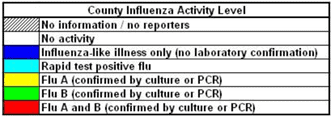With flu season underway, Ally Medical is offering important information to Texans interested in helping to prevent, identify, and treat influenza (flu) infections.
According to the Centers for Disease Control and Prevention (CDC), flu is a contagious respiratory illness caused by the influenza virus that infects the nose, throat, and sometimes the lungs. Seasonal flu virus infections are most common during the fall and winter, and different types of flu (A & B) can spread quickly.
The latest data from CDC’s interactive online application, FluView, demonstrates Texas’s moderate levels of influenza-like illnesses (ILI), putting our state among the top three in the nation for activity levels.

Note: This system monitors visits for respiratory illness that includes fever plus a cough or sore throat, also referred to as ILI, not laboratory confirmed influenza and may capture patient visits due to other respiratory pathogens that cause similar symptoms.
Source: FluView, CDC
Regionally, influenza A appears to be the most common type in Central and North Texas.

Note: The majority of influenza cases are not reportable by law in Texas. This map contains data from sentinel sites and only displays influenza and ILI cases that were reported to public health. Positive laboratory results are reported according to specimen collection date, or date received in the laboratory if the former is unknown.

Source: Texas Department of Health Services
While illness isn’t always avoidable, you can take prevention steps to alleviate the risk of infection. First and foremost, the CDC recommends an annual flu vaccine as the best way to protect yourself against the flu. The flu can spread easily and quickly through an infected person coughing, sneezing, or talking.
“Everyday preventable actions you can take to prevent the spread of germs include avoiding contact with sick people, covering your nose and mouth when you cough or sneeze, washing your hands, and avoiding touching your face,” said Dr. Jeremy Kenter, Chief Medical Officer at Ally Medical.
Additionally, correctly identifying flu symptoms – fever, cough, sore throat, runny or stuffy nose, body aches, headache, chills, and fatigue – is crucial. If you show these symptoms, you should stay home from work or school, and if you feel bad enough, visit your doctor.
“Many people ask how you can tell the difference between the flu and COVID-19,” said Dr. Kenter. “Differentiating these two infections based on symptoms alone is challenging because they cause similar symptoms. Therefore, testing is imperative to confirm a diagnosis and determine the correct course of treatment.”
If you have a flu infection or COVID-19, stay home to avoid spreading the virus. Taking medication, like acetaminophen or ibuprofen, to reduce your fever, drinking plenty of water, and getting plenty of rest to help your body fight the virus, are helpful steps to recovery. Prescription influenza and COVID-19 antiviral medications are also available to treat both illnesses.
During this flu season, keep yourself and your family safe by vaccinating and practicing clean hygiene habits. For more information on the flu or to locate an Ally Medical facility near you, visit www.allymedical.com.



